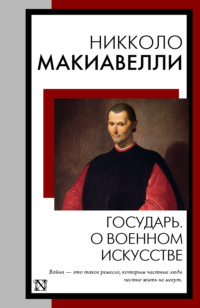
Полная версия
The Prince

THE PRINCE
Niccolò Machiavelli

CONTENTS
Cover
Title Page
Niccolò Machiavelli to the Most Illustrious Lorenzo, Son of Piero De’ Medici
Chapter 1 The several sorts of Governments, and after what manner they are obtained
Chapter 2 Of Hereditary Principalities
Chapter 3 Of Mixed Principalities
Chapter 4 Why the Kingdom of Darius, usurped by Alexander, did not rebel against his Successors, after Alexander was dead
Chapter 5 How such Cities and Principalities are to be governed who lived under their own Laws before they were subdued
Chapter 6 Of Principalities acquired by one’s own proper conduct and arms
Chapter 7 Of new Principalities acquired by accident and the supplies of other people
Chapter 8 Of such as have arrived at their Dominion by wicked and unjustifiable means
Chapter 9 Of Civil Principality
Chapter 10 How the strength of all Principalities is to be computed
Chapter 11 Of Ecclesiastical Principalities
Chapter 12 How many Forms there are of Military Discipline, and of those Soldiers which are called Mercenary
Chapter 13 Of Auxiliaries, Mixed, and Natural Soldiers
Chapter 14 The Duty of a Prince in relation to his Militia
Chapter 15 Of such things as render Men (especially Princes) worthy of Blame or Applause
Chapter 16 Of Liberality and Parsimony
Chapter 17 Of Cruelty and Clemency, and whether it is best for a Prince to be beloved or feared
Chapter 18 How far a Prince is obliged by his Promise
Chapter 19 That Princes ought to be cautious of becoming either odious or contemptible
Chapter 20 Whether Citadels, and other things which Princes many times do, be profitable or dangerous
Chapter 21 How a Prince is to demean himself to gain reputation
Chapter 22 Of the Secretaries of Princes
Chapter 23 How Flatterers are to be avoided
Chapter 24 How it came to pass that the Princes of Italy have most of them lost their dominions
Chapter 25 How far in human affairs Fortune may avail, and in what manner she may be resisted
Chapter 26 An Exhortation to deliver Italy from the Barbarians
Classic Literature: Words and Phrases Adapted from the Collins English Dictionary
About the Author
History of Collins
Copyright
About the Publisher
Niccolò Machiavelli to the Most Illustrious Lorenzo, Son of Piero De’ Medici
Those who desire the favour of a prince do commonly introduce themselves by presenting him with such things as he either values much or does more than ordinarily delight in; for which reason he is frequently presented with horses, arms, cloth of gold, jewels, and such ornaments as are suitable to his quality and grandeur. Being ambitious to present myself to your Highness with some testimony of my devotions towards you, in all my wardrobe I could not find anything more precious (at least to myself) than the knowledge of the conduct and achievements of great men, which I learned by long conversation in modern affairs and a continual investigation of old. After long and diligent examination, having reduced all into a small volume, I do presume to present to your Highness; and though I cannot think it a work fit to appear in your presence, yet my confidence in your bounty is such, I hope it may be accepted, considering I was not capable of more than presenting you with a faculty of understanding in a short time, what for several years, with infinite labour and hazard, I had been gathering together. Nor have I beautified or adorned it with rhetorical ornations, or such outward embellishments as are usual in such descriptions. I had rather it should pass without any approbation than owe it to anything but the truth and gravity of the matter. I would not have it imputed to me as presumption, if an inferior person, as I am, pretend not only to treat of, but to prescribe and regulate the proceedings of princes; for, as they who take the landscape of a country, to consider the mountains and the nature of the higher places do descend ordinarily into the plains, and dispose themselves upon the hills to take the prospect of the valleys, in like manner, to understand the nature of the people it is necessary to be a prince, and to know the nature of princes it is as requisite to be of the people. May your Highness, then, accept this book with as much kindness as it is presented and if you please diligently and deliberately to reflect upon it you will find in it my extreme desire that your Highness may arrive at that grandeur which fortune and your accomplishments do seem to presage; from which pinnacle of honour, if your Highness vouchsafes at any time to look down upon things below, you will see how unjustly and how continually I have been exposed to the malignity of fortune.
CHAPTER 1 The several sorts of Governments, and after what manner they are obtained
There never was nor is at this day any government in the world by which one man has rule and dominion over another, but it is either a commonwealth, or a monarchy. Monarchies are either hereditary, where the ancestors of the sovereign have been a long time in possession, or where they are but new. The new are either so wholly and entirely (as Milan was to Francis Sforza), or annexed to the hereditary dominions of the conqueror (as the kingdom of Naples to the kingdom of Spain). These territories thus acquired are accustomed either to be subject to some prince, or to live at liberty and free, and are subdued either by his auxiliaries or own forces, by his good fortune or conduct.
CHAPTER 2 Of Hereditary Principalities
I shall omit speaking of commonwealths, as having discoursed of them largely elsewhere, and write in this place only of principalities, and how, according to the foregoing division, the said principalities may be governed and maintained. I do affirm, then, that hereditary states, and such as have been accustomed to the family of their prince, are preserved with less difficulty than the new, and because it is sufficient not to transgress the examples of their predecessors, and next to comply and frame themselves to the accidents that occur. So that, if the prince be a person of competent industry, he will be sure to keep himself in the throne, unless he be supplanted by some great and more than ordinary force; and even then, when so supplanted, fortune can never turn tail, or be adverse to the usurper, but he will stand fair to be restored. Of this Italy affords us an example in the Duke of Ferrara, who supported bravely against the invasion of the Venetians in 1484, and afterwards against Pope Julius X, upon no other foundation but his antiquity in that government; for a natural prince has not so much occasion or necessity to oppress his subjects, whereby it follows he must be better beloved, and retain more of the affections of his people, unless some extraordinary vices concur to make him odious; so that the succession and coherence of his government takes away the causes and memory of innovations; for one new change leaves always (as in buildings) a toothing and aptitude of another.
CHAPTER 3 Of Mixed Principalities
But the difficulties consist in governments lately acquired, especially if not absolutely new, but as members annexed to the territories of the usurper, in which case such a government is called mixed. The tumults and revolutions in such monarchies proceed from a natural crossness and difficulty in all new conquests; for men do easily part with their prince upon hopes of bettering their condition, and that hope provokes them to rebel; but most commonly they are mistaken, and experience tells them their condition is much worse.
This proceeds from another natural and ordinary cause, necessitating the new prince to overlay or disgust his new subjects by quartering his army upon them, taxes, or a thousand other inconveniences, which are the perpetual consequents of conquest. So that you make them your enemies who suffer, and are injured by your usurpation, but cannot preserve their friendship who introduced you, because you are neither able to satisfy their expectation, or employ strong remedies against them, by reason of your obligations; wherefore, though an usurper be never so strong, and his army never so numerous, he must have intelligence with the natives if he means to conquer a province. For these reasons Louis XII of France quickly subdued Milan, and lost it as quickly; for the same people which opened him their gates, finding themselves deceived in their hopes, and disappointed in the future benefits which they expected, could not brook nor comport with the haughtiness of their new sovereign: it is very true countries that have rebelled and are conquered the second time are recovered with more difficulty; for the defection of the people having taken off all obligation or respect from the usurper, he takes more liberty to secure himself by punishing offenders, exposing the suspected, and fortifying wherever he finds himself weak; so that Count Lodovick having been able to rescue Milan out of the hands of the French the first time only by harassing and infesting its borders, the second time he recovered it it was necessary for him to arm and confederate the whole world against the said king, and that his army should be beaten and driven out of Italy; and this happened from the aforesaid occasions: nevertheless the French were twice dispossessed. The general reasons of the first we have already discoursed, it remains now that we take a prospect of the second, and declare what remedies the said King Louis had, or what another may have in his condition, to preserve himself better in his new conquests than the King of France did before him. I say, then, that provinces newly acquired, and joined to the ancient territory of him who conquered them, are either of the same country, or language, or otherwise. In the first case they are easily kept, especially if the people have not been too much accustomed to liberty; and to secure the possession there needs no more than to extirpate the family of the prince which governed before; for in other things maintaining to them their old condition, there being no discrepancy in their customs, men do acquiesce and live quietly, as has been seen in the cases of Burgundy, Bretagne, Gascoigne, and Normandy, which have continued so long under the government of France; for though there be some difference in their language, nevertheless, their laws and customs being alike, they do easily consist. He therefore who acquires anything, and desires to preserve it, is obliged to have a care of two things more particularly; one is, that the family of the former prince be extinguished; the other, that no law or taxes be imposed: whereby it will come to pass, that in a short time it may be annexed and consolidated with his old principality. But where conquest is made in a country differing in language, customs and laws, there is the great difficulty; their good fortune and great industry is requisite to keep it. And one of the best and most efficacious expedients to do it would be for the usurper to live there himself, which would render his possession more secure and durable, as the great Turk has done in Greece, who, in despite of all his practices and policies to keep it in subjection, had he not fixed his imperial residence there would never have been able to have effected it. For being present in person, disorders are discovered in the bud and prevented, but being at a distance in some remote part, they come only by hearsay, and that, when they are got to a head, are commonly incurable. Besides, the province is not subject to be pillaged by officers, by reason of the nearness and accessibleness of their prince, which disposes those to love him who are good, and those to dread him who are otherwise; and if any foreigner attacks it, he must do it with more care and circumspection, in respect that the prince’s residence being there it will be harder for him to lose it.
There is another remedy, rather better than worse, and that is, to plant colonies in one or two places, which may be as it were the keys of that State, and either that must be done of necessity, or an army of horse and foot be maintained in those parts, which is much worse; for colonies are of no great expense; the Prince sends and maintains them at very little charge, and intrenches only upon such as he is constrained to dispossess of their houses and land for the subsistence and accommodation of the new inhabitants, who are but few, and a small part of the State; they also who are injured and offended, living dispersed and in poverty, cannot do any mischief, and the rest being quiet and undisturbed, will not stir, lest they should mistake and run themselves into the same condition with their neighbours.
I conclude, likewise, that those colonies which are least chargeable are most faithful and inoffensive, and those few who are offended are too poor and dispersed to do any hurt, as I said before; and it is to be observed, men are either to be flattered and indulged or utterly destroyed—because for small offences they do usually revenge themselves, but for great ones they cannot—so that injury is to be done in such a manner as not to fear any revenge. But if instead of colonies an army be kept on foot, it will be much more expensive, and the whole revenue of that province being consumed in the keeping it, the acquisition will be a loss, and rather a prejudice than otherwise, by removing the camp up and down the country, and changing their quarters, which is an inconvenience every man will resent and be ready to revenge, and they are the most dangerous and implacable enemies who are provoked by insolences committed against them in their own houses. In all respects, therefore, this kind of guard is unprofitable, whereas on the other side colonies are useful. Moreover, he who is in a province of a different constitution, as is said before, ought to make himself head and protector of his inferior neighbours, and endeavour with all diligence to weaken and debilitate such as are more powerful, and to have a particular care that no stranger enters into the said province with as much power as he; for it will always happen that somebody or other will be invited by the malcontents, either out of ambition or fear. This is visible in the Etolians, who brought the Romans into Greece, who were never admitted into any province but by the temptation of the natives. The common method in such cases is this: as soon as a foreign potentate enters into a province, those who are weaker or disobliged join themselves with him out of emulation and animosity to those who are above them, insomuch that in respect of these inferior lords, no pains is to be omitted that may gain them; and when gained, they will readily and unanimously fall into one mass with the State that is conquered. Only the conqueror is to take special care they grow not too strong, nor be entrusted with too much authority, and then he can easily with his own forces and their assistance keep down the greatness of his neighbours, and make himself absolute arbiter in that province. And he who acts not this part prudently shall quickly lose what he has got, and even whilst he enjoys it be obnoxious to many troubles and inconveniences. The Romans in their new conquests observed this course, they planted their colonies, entertained the inferior lords into their protection without increasing their power; they kept under such as were more potent, and would not suffer any foreign prince to have interest among them. I will set down only Greece for an example. The Etolians and Achaians were protected, the kingdom of the Macedonians was depressed and Antiochus driven out; yet the merits and fidelity of the Achaians and Etolians could never procure them any increase of authority, nor the persuasions and applications of Philip induce the Romans to be his friends till he was overcome, nor the power of Antiochus prevail with them to consent that he should retain any sovereignty in that province: for the Romans acted in that case as all wise princes ought to do who are to have an eye not only upon present but future incommodities, and to redress them with all possible industry; for dangers that are seen afar off are easily prevented, but protracting till they are at hand, the remedies grow unseasonable and the malady incurable. And it falls out in this case, as the physicians say of an hectic fever, that at first it is easily cured and hard to be known, but in process of time, not being observed or resisted in the beginning, it becomes easy to be known but very difficult to be cured. So it is in matters of state, things which are discovered at a distance—which is done only by prudent men—produce little mischief but what is easily averted; but when through ignorance or inadvertency they come to that height that every one discerns them, there is no room for any remedy, and the disease is incurable. The Romans, therefore, foreseeing their troubles afar off, opposed themselves in time, and never swallowed any injury to put off a war, for they knew that war was not avoided but deferred thereby, and commonly with advantage to the enemy; wherefore they chose rather to make war upon Philip, and Antiochus in Greece, than suffer them to invade Italy; and yet at that time there was no necessity of either; they might have avoided them both, but they thought it not fit; for they could never relish the saying that is so frequent in the mouths of our new politicians “to enjoy the present benefit of time,” but preferred the exercise of their courage and wisdom, for time carries all things along with it, and may bring good as well as evil, and ill as well as good. But let us return to France, and examine if what was there done was conformable to what is prescribed here; and to this purpose I shall not speak of Charles VIII but of Louis XII, as of a prince whose conduct and affairs (by reason his possession was longer in Italy) were more conspicuous, and you shall see how contrary he acted in everything that was necessary for the keeping of so different a State. This Louis was invited into Italy by the Venetians, who had an ambition to have got half Lombardy by his coming. I will not condemn the expedition, nor blame the counsels of that King for being desirous of footing in Italy, and having no allies left in that country, but all doors shut against him (upon the ill-treatment which his predecessor Charles had used towards them) he was constrained to take his friends where he could find them, and that resolution would have been lucky enough had he not miscarried in his other administration; for he had no sooner subdued Lombardy but he recovered all the reputation and dignity that was lost by King Charles. Genoa submitted, Florence courted his friendship, the Marquis of Mantua, the Duke of Ferrara, Bentivoglio, Madam de Furli, the Lords of Faenza, Pesoro, Rimini, Camerino, Piombino; the Lucchesi, Pisani, Sanesi, all of them address themselves to him for his alliance and amity; then the Venetians began to consider and reflect upon their indiscretion, who, to gain two towns in Lombardy, had made the King of France master of two-thirds of all Italy. Let any one now think with how little difficulty the said king might have kept up his reputation in that country if he had observed the rules aforesaid and protected his friends, who being numerous, and yet weak and fearful (some of the Pope, and some of the Venetians), were always under a necessity of standing by him, and with their assistance he might easily have secured himself against any competitor whatever. But he was no sooner in Milan but he began to prevaricate and send supplies to Pope Alexander to put him in possession of Romagna, not considering that thereby he weakened himself and disobliged his friends who had thrown themselves into his arms, and aggrandized the Church by adding to its spiritual authority (which was so formidable before) so great a proportion of temporal; and having committed one error, he was forced to proceed so far as to put a stop to the ambition of Pope Alexander, and hinder his making himself master of Tuscany; the said Louis was forced into Italy again. Nor was it enough for him to have advanced the interest of the Church and deserted his friends, but out of an ardent desire to the kingdom of Naples he shared it with the King of Spain; so that whereas before he was sole umpire in Italy, he now entertained a partner, to whom the ambitious of that province and his own malcontents might repair upon occasion; and whereas the King of that kingdom might have been made his pensioner, he turned out him to put in another that might be able to turn out himself. It is very obvious, and no more than natural, for princes to desire to extend their dominion, and when they attempt nothing but what they are able to achieve they are applauded, at least not upbraided thereby; but when they are unable to compass it, and yet will be doing, then they are condemned, and indeed not unworthily.
If France, then, with its own forces alone, had been able to have enterprised upon Naples, it ought to have been done; but if her own private strength was too weak, it ought not to have been divided: and if the division of Lombardy, to which he consented with the Venetian, was excusable, it was because done to get footing in Italy; but this partition of Naples with the King of Spain is extremely to be condemned, because not pressed or quickened by such necessity as the former. Louis therefore committed five faults in this expedition. He ruined the inferior lords; he augmented the dominion of a neighbour prince; he called in a foreigner as puissant as himself; he neglected to continue there in person; and planted no colonies—all which errors might have been no inconvenience whilst he had lived, had he not been guilty of a sixth, and that was depressing the power of the Venetian. If indeed he had not sided with the Church, nor brought the Spaniards into Italy, it had been but reasonable for him to have taken down the pride of the Venetian; but pursuing his first resolutions, he ought not to have suffered them to be ruined, because whilst the Venetian strength was entire, they would have kept off other people from attempting upon Lombardy, to which the Venetian would never have consented, unless upon condition it might have been delivered to them, and the others would not in probability have forced it from France to have given it to them; and to have contended with them both nobody would have had the courage. If it be urged that King Louis gave up Romagna to the Pope, and the kingdom of Naples to the King of Spain, to evade a war, I answer, as before, that a present mischief is not to be suffered to prevent a war, for the war is not averted but protracted, and will follow with greater disadvantage.
If the King’s faith and engagements to the Pope to undertake this enterprise for him be objected, and that he did it to recompense the dissolution of his marriage, and the cap which at his intercession his Holiness had conferred upon the Legate of Amboise, I refer them for an answer to what I shall say hereafter about the faith of a prince, how far it obliges. So then King Louis lost Lombardy because he did not observe one of those rules which others have followed with success in the conquest of provinces, and in their desire to keep them; nor is it an extraordinary thing, but what happens every day, and not without reason. To this purpose, I remember I was once in discourse with the Cardinal d’Amboise at Nantes, at the time when Valentino (for so Cæsar Borgia, Pope Alexander’s son was commonly called) possessed himself of Romagna. In the heat of our conference, the Cardinal telling me that the Italians were ignorant of the art of war, I replied that the French had as little skill in matters of State; for if they had had the least policy in the world they would never have suffered the Church to have come to that height and elevation. And it has been found since by experience, that the grandeur of the Church and the Spaniard in Italy is derived from France, and that they in requital have been the ruin and expulsion of the French.











